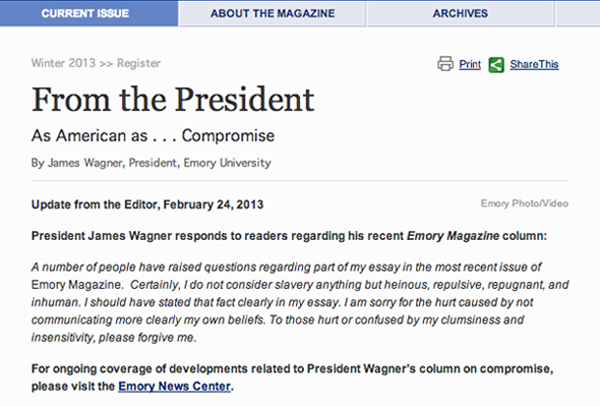Ninety percent of University President James W. Wagner’s response for his controversial column on compromise has been taken down.
The full statement appears to have been truncated to include only the first 71 words of Wagner’s 687-word response before directing readers to the Emory News Center and an article written by Nancy Seideman, the associate vice president of university communications.
Published in the winter issue of Emory Magazine, the piece sparked local and national outrage two weeks ago when Wagner upheld the Three-Fifths Compromise as an example of political compromise. By Sunday, Feb. 17, Wagner had added a statement to the column, clarifying his opposition to slavery and explaining what he intended to say.
A Google-cached version of the webpage shows that as of Friday, Feb. 22, the full response was still on the page. The page, though, was updated on Sunday, Feb. 24.
Editor of Emory Magazine Paige Parvin responded in an email to the Wheel saying that “based on community feedback, it was obvious that the essential part of President Wagner’s statement was the apology in the first paragraph. The remainder reiterated the argument in his original column and was not adding to the conversation.”
Many, though, found Wagner’s response to be insufficient. As previously reported, at a monthly College faculty meeting, one faculty member criticized Wagner since “part of his explanation was an apology for hurting feelings.”
“We need to be attentive that hurting feelings is not the issue here,” the faculty member said. “It’s not against the law to hurt feelings, but in a democracy, it’s unethical to contribute to the culture of discrimination, and I think that’s what this statement did.”
– By Evan Mah
The Emory Wheel was founded in 1919 and is currently the only independent, student-run newspaper of Emory University. The Wheel publishes weekly on Wednesdays during the academic year, except during University holidays and scheduled publication intermissions.
The Wheel is financially and editorially independent from the University. All of its content is generated by the Wheel’s more than 100 student staff members and contributing writers, and its printing costs are covered by profits from self-generated advertising sales.





I care about this even less than I care about emory sports. Is this even about racial sensitivity anymore? I’m pretty sure at this point it’s just people from humanities departments that were effected by the cuts looking for anything to be mad about perpetuating this.
“Emory is a community that airs its laundry,” Dr. Wagner said in the interview, calling that a strength and a demonstration of its ability to evolve with its student body. – NYTs, 2/23/13
I don’t you have to be in the humanities to see this kind of thing as more or less sketchballs and hypocritical to boot.
And are you paying attention to the data about the cuts? Have you read the university’s own data about race and the cuts? Or do you just not care?
I don’t agree with the way that the cuts were made. Previously I have agreed with the cuts protests. Yes, I have read the data. But I think that making the assertion that the cuts are racist is a distasteful instance of crying wolf, and the focus should be shifted back to the lack of transparency in the decision-making that led to the cuts in the first place and how that can be corrected in the future.
If that process of review is going to be legitimate, we need to have the people who got cut at the table, however “distasteful” their views on the situation may be for some to entertain. Accepting the dictates of power on this one and letting the people most effected by it fade away from our thinking, acquiescing to what happened to them by ratifying their unfair treatment so that we can peaceably “move forward” is very similar to what’s wrong with Wagner’s praising the model of the 3/5ths Compromise in the first place.
It does make a catchy metaphor, I’ll give you that, but I really don’t think it adds anything real to the argument. It just adds to a sensationalized controversy, which makes it easier for others to indiscriminately dismiss the parts of the cuts argument that are actually legitimate. (But aren’t making the front page of the nytimes.)
And honestly I don’t think you have to be in the humanities to tell that the process beyond the cuts was warped and opaque and full of double-talk and deception, and that should be a problem for you even if your own position is totally secure, and especially so if it’s not. Hell, the Chair of CFAC is on the record to press that he would regularly lie about what his committee was doing. And now we can’t even get honesty from Wagner’s office when it comes to maintaining their own public record of their statements, why should we trust them behind closed doors?
But even if you don’t care about that, and agree that the humanities should be cut, you should care about how downright inept the people managing our university’s PR are. At this point we’re becoming THAT SCHOOL down South – hell, Joan Rivers was cracking jokes about us on NY radio this morning – and it’s more or less because our PR staff and admin media relations are bush league embarrassing. These people care about image more than anything else and though that fact alone should bother you, you should absolutely care about how inept they are at maintaining even that. You should care about our image being managed by people who just seem driven to keep screwing the pooch in public.
Right on!!!
This column will definitely hurt emory’s reputation, but the negative effects have enlarged by the faculties of humanities department. I have no idea why those people protest. I don’t think the cut will hurt a lot except the Econ PhD program. I mean, the visual arts has never been strong at emory. Emory should really focus on what we are good at and proud of.
“Emory should really focus on what we are good at and proud of.”
Churning out doctors, lawyers, and investment bankers?
Among the groups “hurt” by the cuts was a hundred-year-old education department, one that has produced more African American PhDs than any other program in the country. Was that an endeavor we weren’t “good at” or was it one of the one’s we aren’t “proud of.”?
Find an African-American donor that is willing to keep it open. Stop bitching and take action.
Last week at the monthly Emory College of Arts and Sciences faculty meeting, the faculty voted almost unanimously to censure Wagner for his remarks in the column. Approx. 200 voted for censure. So contrary to what some posters say here, the concerned faculty are in every part of the college. They are not just humanities faculty. The near unanimous vote for censure signals that a significant majority of the college faculty at Emory are concerned about (1) the flawed logic of the article, (2) the article’s misunderstanding of history, (3) the racist implications of the article and the process through which it appeared in print, and (4) how 1-3 reflect upon the intellectual and ethical caliber of the university. In addition, there is concern about: (5) the article’s implication that the recent decision about cuts was reached by a process of open discussion, deliberation, and compromise. Since the Fall 2012 decision was reached in a different way, many faculty see (5) as disingenuous.
My dream retirement would involve a great log cabin in the mountains. Who needs a beach?